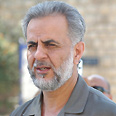
MK Ibrahim Sarsur
צילום: ירון ברנר
MK Sarsur: We must act together to liberate Jerusalem
At 'Jerusalem First' conference in Ramallah, MK Ibrahim Sarsur calls on Muslims and Arabs to focus on 'liberating' Jerusalem. MK Mohammad Barakeh attacks Israel for trying to 'empty Jerusalem of its Palestinian inhabitants.' PA's top Jerusalem official: Jews have no religious or political connection to Jerusalem
At a conference entitled "Jerusalem First," held in Ramallah on Sunday, the chairman of the United Arab List-Ta'al, Knesset Member Ibrahim Sarsur, called on all Arabs and Muslims to focus their energies on the future of Jerusalem. "If we act in concert, we can become a torrent on the road to liberation," he declared.
In his comments, Sarsur emphasized the religious importance of Jerusalem for Muslims and said that Israeli plans for the Al-Aqsa Mosque, and all around the city, must be resisted. "Just as the Muslims liberated Jerusalem from the Crusaders, so we must believe that today, too, the liberation of Jerusalem is not an impossible mission," he said, adding that "security, peace and stability will be achieved only when the city is liberated."
Sarsur emphasized that "Muslims around the world need to concentrate their energies on Jerusalem, not on Iraq or Kashmir or any other place, because Jerusalem is the central and most dangerous issue and thus must form the banner and the framework for the struggle of Muslims and Arabs around the world."
Hadash Party Chairman MK Mohammed Barakeh, another conference participant, sharply attacked Israeli policy in the capital, claiming that it sought to empty the city of its Palestinian inhabitants. Addressing the assembled delegates, he said: "I ask, what have we done to fight the plans of the Israeli occupation? What are we doing while Israel is deploying money and legions of clerks with the purpose of implementing its plans in Jerusalem? We need to coordinate Palestinian actions, making them more organized and giving them more leverage."
Barakeh emphasized that Israeli strategic initiatives in the city did not begin with the recent excavations and construction at Mugrabi Gate. "The Israeli plan began in 1967 with the city's annexation, when Israel brought 190,000 settlers to the Jerusalem area in order to guarantee a Jewish majority." He also asserted that "the racist separation fence brought about the flight of 150,000 Palestinians from Jerusalem."
Jerusalem - not just a religious issue
Barakeh warned the conference delegates not to concentrate exclusively on Jerusalem's religious aspects. "With all due respect to the city's holiness, Jerusalem is first and foremost a national issue, not just a religious issue. Jerusalem is the capital of the Palestinian state, but we must be careful because the Israelis are taking actions intended to empty Jerusalem of its Palestinian inhabitants and strengthen the Jewish majority.
"In addition," Barakeh warned, "the Israelis are working to empty the city of its Palestinian assets. This is happening with the theft of the property of the Greek Orthodox Patriarchate in Jerusalem. Israel seeks to take advantage of the church's silence about the theft of its assets to bargain over the recognition of the patriarch.
"With all due respect to Al-Aqsa Mosque and its holiness," Barakeh declared, "if Israel succeeds in emptying Jerusalem of its residents, what will be the city's importance? The city, if it has no inhabitants, will be no more than stones."
Barakeh told the assembled delegates that in 1994, when Yassir Arafat returned to the Palestinian territories, he told Hadash representatives that he hoped they would soon all pray together at Al-Aqsa Mosque. According to Barakeh, he responded that "we don't want to enter Jerusalem merely as worshippers, we want to accompany (Arafat) as the head of a Palestinian state whose capital is Jerusalem."
The Palestinian Authority's "governor of Jerusalem," another conference participant, said that "despite all our fears, we are managing to survive in Jerusalem. In 1967 there were 70,000 Palestinians in Jerusalem and now we are 300,000. If the Palestinian Authority government appropriates the necessary funding, and relying on demographics, Israel cannot defeat us in Jerusalem." He also asserted that "no historian or archeaologist - even Israeli ones - have ever succeeded in proving that there is a historically based religious or political link between the Jews and Jerusalem."










